- Mark O'Mara: Writer charged murder defendant Pistorius took "acting lessons" for court
- O'Mara: True, he seemed on-point, but why shouldn't he be? He's trying to show innocence
- He says in litigation, as in life, we show ourselves in best light. Lawyers indeed coach clients
- O'Mara: Police, prosecutors, witnesses do it, too. Welcome to litigation. Pistorius is entitled
Editor's note: Mark O'Mara is a CNN Legal Analyst. He is a criminal defense attorney who frequently writes and speaks about issues related to race, guns, and self defense in the context of the American criminal justice system. The opinions expressed in this commentary are solely those of the author.
(CNN) -- South African newspaper columnist Jani Allan accused Oscar Pistorius of taking "acting lessons" before his testimony at his murder trial. Pistorius has claimed that he accidentally killed his girlfriend, Reeva Steenkamp after mistaking her for an intruder to his home in Pretoria.
I have to admit, as a criminal defense attorney, I found his testimony unusually well-focused and on-point as he attempted to accomplish what he needed to. It was this: to convince the judge (there is no jury in this case) that he was acting out of instinct and fear--rather than anger and hatred--when he fired four fatal shots through a locked bathroom door.

Is it not Pistorius' right to figure out how to best present that position to the judge? Is it somehow wrong for a defendant to craft or polish his presentation to positively affect the judge's (or jury's) decision? Yes, it is his right, and no it's not wrong; welcome to the underbelly of litigation. However, it's the same underbelly that exists in business and even in social interactions.
We all learn even as children to speak properly, to "mind our manners" and to "put our best foot forward." Suggesting that people don't prepare for or rehearse important interactions is not just folly; it goes against what we've been taught since we've learned to listen. On that first date, we try to look as good as we can, be as funny as we can, appear as insightful as we can. Before a job interview we study the employer and the industry. Before asking for a raise, we present our value in the warmest light possible.
Good lawyers have spent their careers learning how to present their clients in the most favorable light possible during litigation. It's our responsibility. Criminal defense lawyers learn how to be persuasive and genuine when presenting their side of the story. We are trained to represent clients, any clients, as best we can and to seek the proper result for that client. Prosecutors know how to polish their presentations as well.
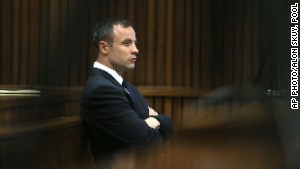 Pistorius trial adjourns after 25 days
Pistorius trial adjourns after 25 days 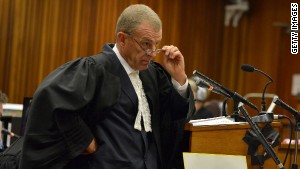 Pistorius cross-examination highlights
Pistorius cross-examination highlights 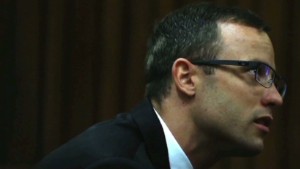 Pistorius trial cross-examination ends
Pistorius trial cross-examination ends In civil law, when many millions of dollars are on the line, corporate representatives plan for hours, days, weeks, months--even years--to properly present their side of the case. They take part in mock trial, the sole purpose of which is to identify and correct weaknesses in their presentation, to gain insight from how that presentation worked with mock jurors.
Back to the question at hand: Did Pistorius have acting lessons? This will now sound insincere, but I have never, not in 30 years of practice, had a client take "acting lessons" or any other lessons regarding how to testify. But I have spent hours with witnesses and clients reviewing with them how to present themselves and their story in the most compelling and believable way.
But remember this: Law enforcement officers also go through extensive training in how to present themselves in a courtroom, from subtleties as simple as turning toward the jury when answering a question to presenting their testimony in simple, easy-to-understand phrases, to raising and lowering their voices at just the right time. Expert witnesses are paid well for their ability to communicate their testimony effectively and believably to a jury.
So is it any less appropriate for Pistorius to have reviewed his testimony with his lawyers? Would it be wrong if Pistorius had the benefit of a "testimony presentation expert"? The answer is no, it is not inappropriate, as long as Pistorius was telling the truth.
The important question is: Did he present his testimony in a way in which the judge believed he was sincere? Or will the judge believe he was coached and acting? Judges and jurors alike are not easily fooled, and they bring to the courtroom life experiences that prepare them to detect deception and insincerity.
It is also the duty of the advocates on both sides of the story to advise or remind the fact finders that testimony is what it is: prepared, coached, rehearsed and presented as well as possible.
My belief is that Pistorius was absolutely coached. I also believe the judge thinks so, too, and when she weighs Pistorius' testimony, she will take into consideration that it was perhaps too well polished and that it was too well rehearsed. That was, after all, a significant goal of the blistering cross examination, to show that coaching.
I say we trust in fact finders -- in this case the judge, and, in the United States, the jurors -- and understand that they know how to balance the content of a testimony with the sincerity, or lack of sincerity, with which it was delivered.
Follow us on Twitter @CNNOpinion.
Join us on Facebook/CNNOpinion.
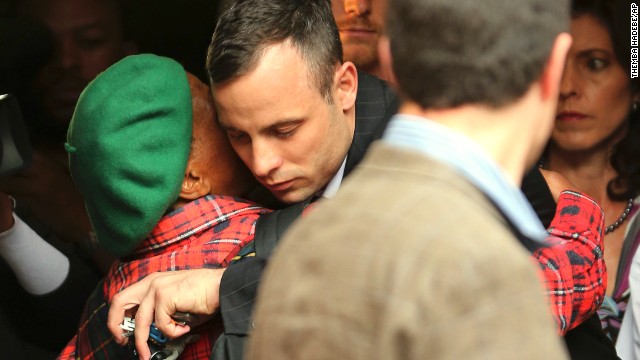 Oscar Pistorius is hugged by a woman as he leaves court in Pretoria, South Africa, on Wednesday, April 16. Pistorius, the first double amputee runner to compete in the Olympics, is accused of intentionally killing his girlfriend, Reeva Steenkamp, in February 2013. Pistorius has pleaded not guilty to murder and three weapons charges.
Oscar Pistorius is hugged by a woman as he leaves court in Pretoria, South Africa, on Wednesday, April 16. Pistorius, the first double amputee runner to compete in the Olympics, is accused of intentionally killing his girlfriend, Reeva Steenkamp, in February 2013. Pistorius has pleaded not guilty to murder and three weapons charges. 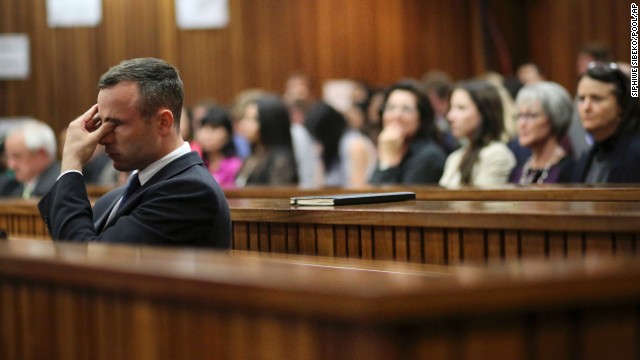 Pistorius rubs his eye Tuesday, April 15, after testifying during his murder trial.
Pistorius rubs his eye Tuesday, April 15, after testifying during his murder trial. 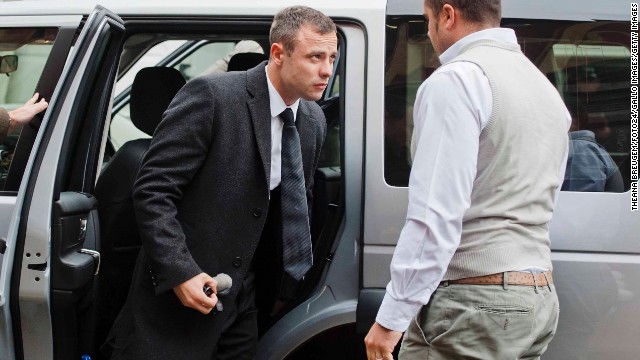 Pistorius arrives at the court in Pretoria on Monday, April 14.
Pistorius arrives at the court in Pretoria on Monday, April 14.  Pistorius' sister, Aimee, cries in court as she listens to her brother's testimony on Tuesday, April 8.
Pistorius' sister, Aimee, cries in court as she listens to her brother's testimony on Tuesday, April 8.  June Steenkamp, Reeva Steenkamp's mother, reacts as she listens to Pistorius' testimony on April 8.
June Steenkamp, Reeva Steenkamp's mother, reacts as she listens to Pistorius' testimony on April 8. 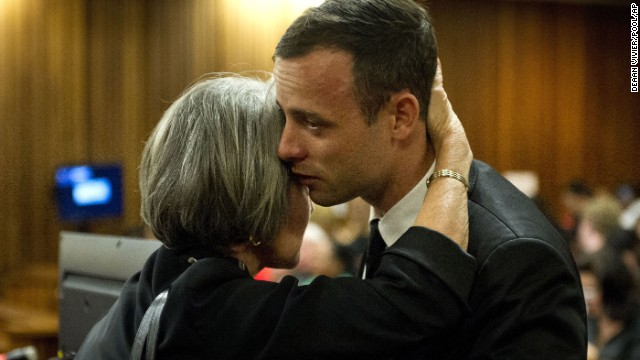 Pistorius is hugged by his aunt Lois Pistorius in court on Monday, April 7.
Pistorius is hugged by his aunt Lois Pistorius in court on Monday, April 7. 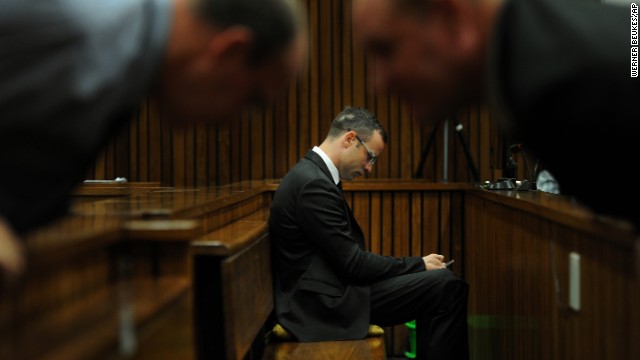 Pistorius sits inside the courtroom as members of his defense team talk in the foreground Friday, March 28.
Pistorius sits inside the courtroom as members of his defense team talk in the foreground Friday, March 28. 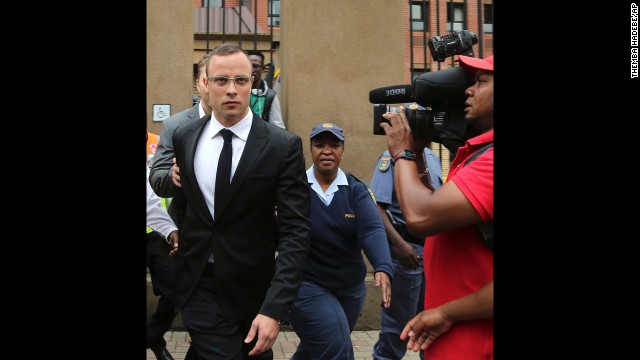 Pistorius leaves court on March 28. The trial was delayed until April 7 because one of the legal experts who will assist the judge in reaching a verdict was sick.
Pistorius leaves court on March 28. The trial was delayed until April 7 because one of the legal experts who will assist the judge in reaching a verdict was sick.  Steenkamp's mother, right, and family friend Jenny Strydom react in court Tuesday, March 25, during cross-questioning.
Steenkamp's mother, right, and family friend Jenny Strydom react in court Tuesday, March 25, during cross-questioning. 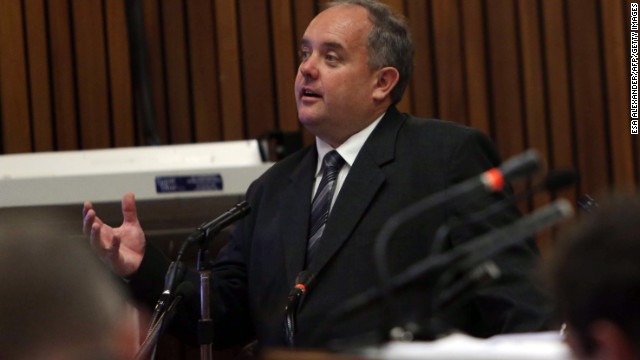 Cell phone analyst Francois Moller testifies during the trial on March 25. Questioned by the prosecution, Moller listed in order the calls made and received by Pistorius after he shot Steenkamp.
Cell phone analyst Francois Moller testifies during the trial on March 25. Questioned by the prosecution, Moller listed in order the calls made and received by Pistorius after he shot Steenkamp. 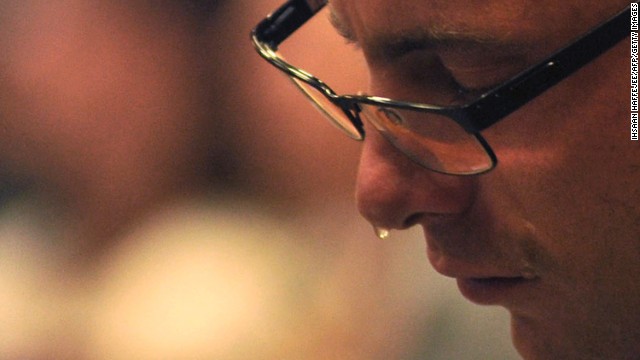 Pistorius cries as he sits in the dock during his trial on Monday, March 24.
Pistorius cries as he sits in the dock during his trial on Monday, March 24. 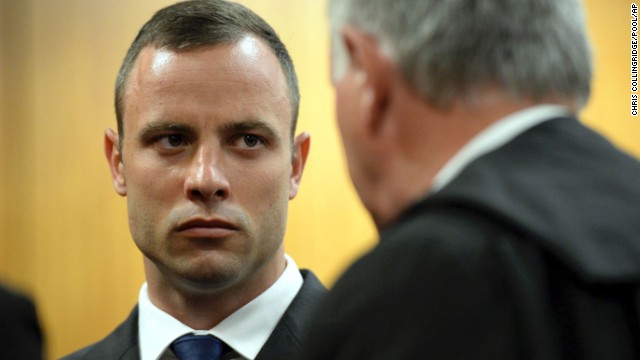 Pistorius talks to defense attorney Barry Roux on March 24.
Pistorius talks to defense attorney Barry Roux on March 24. 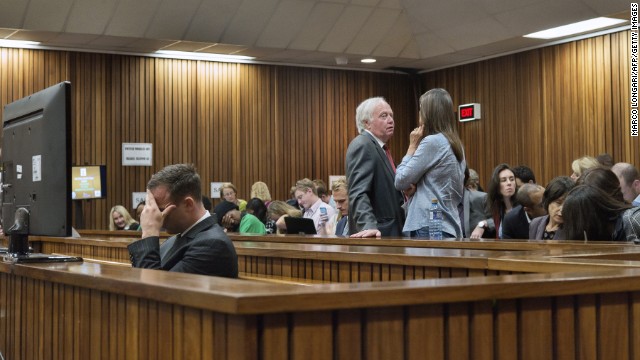 Pistorius holds his head while members of his family talk behind him on Tuesday, March 18.
Pistorius holds his head while members of his family talk behind him on Tuesday, March 18. 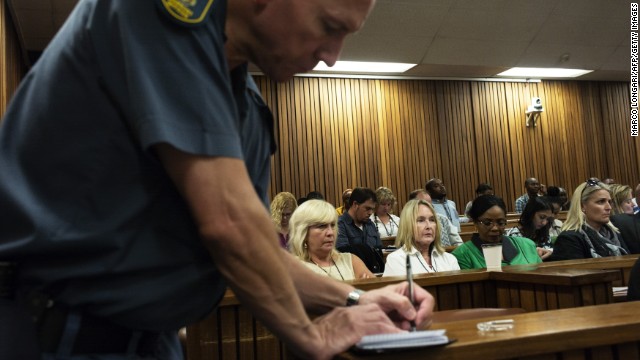 Steenkamp's mother, wearing the white collared shirt, looks on while a police officer takes notes in court March 18.
Steenkamp's mother, wearing the white collared shirt, looks on while a police officer takes notes in court March 18. 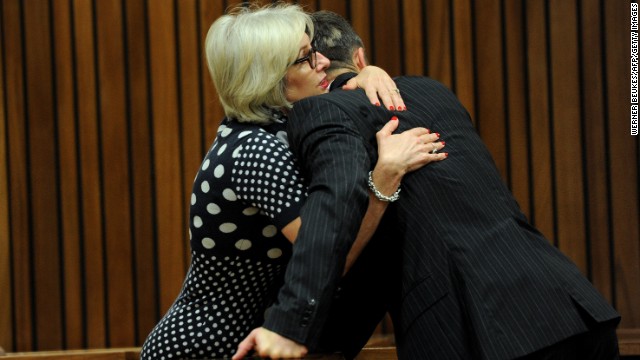 Pistorius is hugged by his aunt Lois on March 18.
Pistorius is hugged by his aunt Lois on March 18. 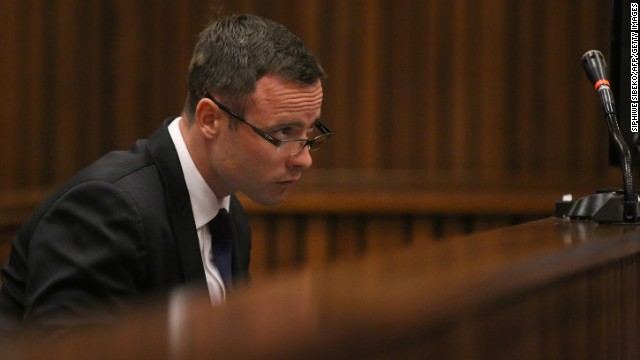 Pistorius takes notes Monday, March 17, as his murder trial enters its third week.
Pistorius takes notes Monday, March 17, as his murder trial enters its third week. 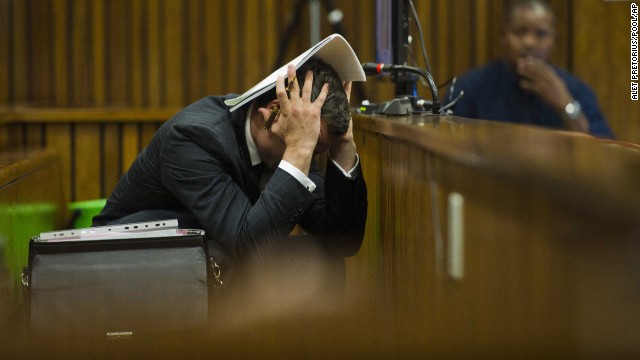 Pistorius covers his head as he listens to forensic evidence Thursday, March 13.
Pistorius covers his head as he listens to forensic evidence Thursday, March 13. 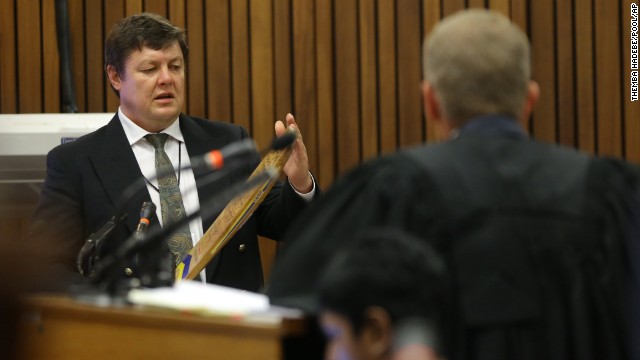 Forensic investigator Johannes Vermeulen, left, is questioned during the trial March 13.
Forensic investigator Johannes Vermeulen, left, is questioned during the trial March 13. 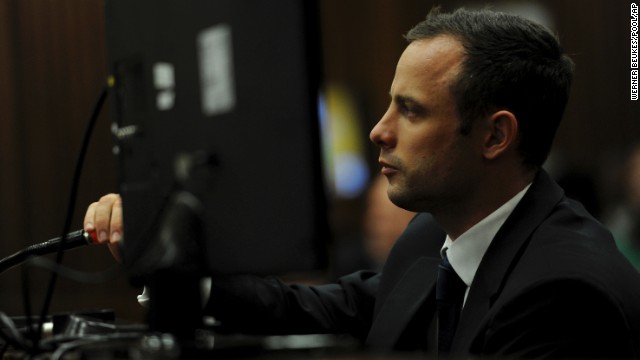 Pistorius listens to questions during his trial on Wednesday, March 12.
Pistorius listens to questions during his trial on Wednesday, March 12. 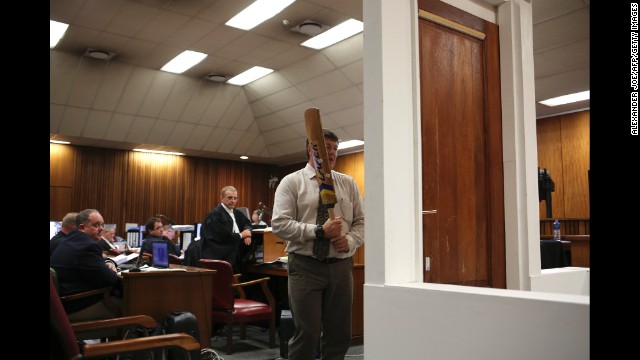 A police officer takes part in a court reconstruction March 12. A police forensic expert said Pistorius was on the stumps of his amputated legs when he knocked down a locked toilet door with a cricket bat to reach his shot girlfriend. That counters the track star's assertion he was wearing his prosthetic legs at the time. Defense attorney Barry Roux countered by suggesting that even with his prosthetic legs on, Pistorius would not be swinging a bat at the same height as an able-bodied person.
A police officer takes part in a court reconstruction March 12. A police forensic expert said Pistorius was on the stumps of his amputated legs when he knocked down a locked toilet door with a cricket bat to reach his shot girlfriend. That counters the track star's assertion he was wearing his prosthetic legs at the time. Defense attorney Barry Roux countered by suggesting that even with his prosthetic legs on, Pistorius would not be swinging a bat at the same height as an able-bodied person.  Pistorius listens to cross-questioning on Monday, March 10.
Pistorius listens to cross-questioning on Monday, March 10. 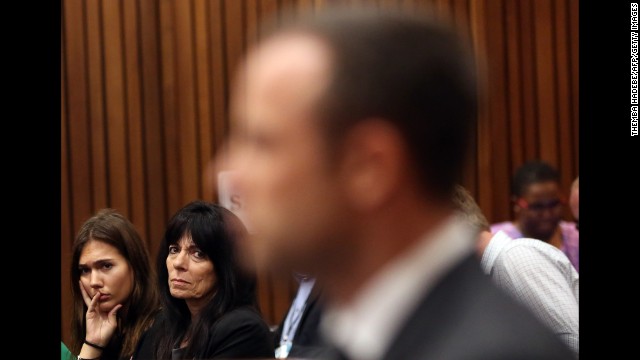 Friends of Steenkamp's family watch Pistorius during his trial on March 7.
Friends of Steenkamp's family watch Pistorius during his trial on March 7.  Pistorius covers his ears on Thursday, March 6, as a witness speaks about the morning Steenkamp was killed.
Pistorius covers his ears on Thursday, March 6, as a witness speaks about the morning Steenkamp was killed. 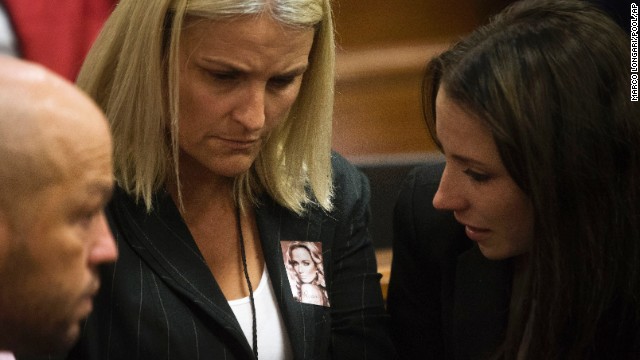 Pistorius' sister, Aimee, right, speaks with members of Steenkamp's family on March 6.
Pistorius' sister, Aimee, right, speaks with members of Steenkamp's family on March 6. 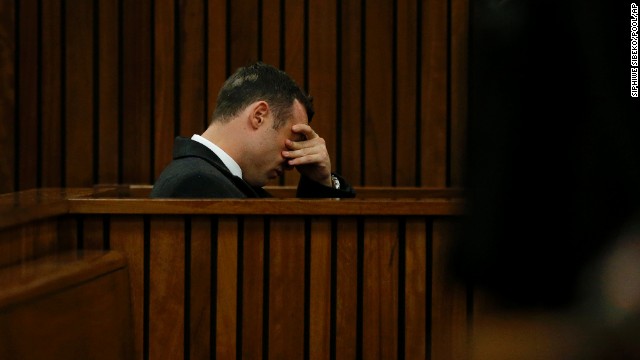 Pistorius sits in court on the third day of his trial Wednesday, March 5.
Pistorius sits in court on the third day of his trial Wednesday, March 5. 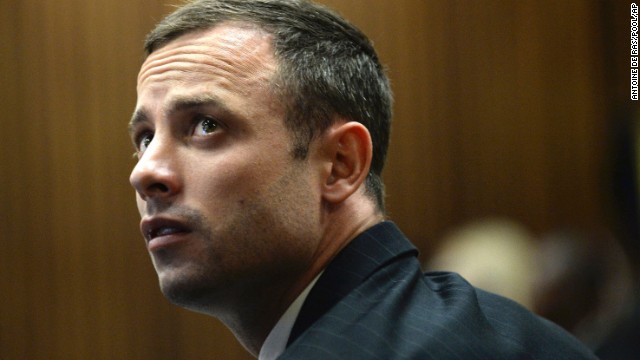 Pistorius appears on the second day of his trial Tuesday, March 4.
Pistorius appears on the second day of his trial Tuesday, March 4. 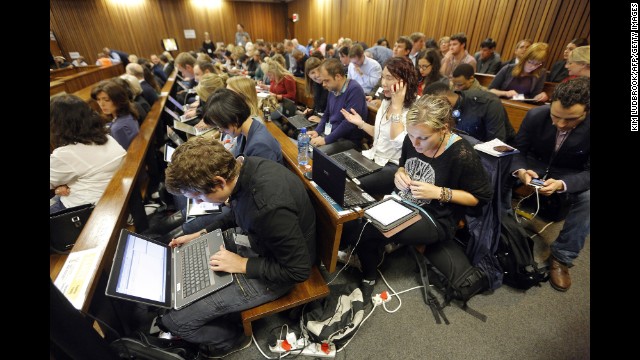 Members of the media work during a break in proceedings March 4.
Members of the media work during a break in proceedings March 4. 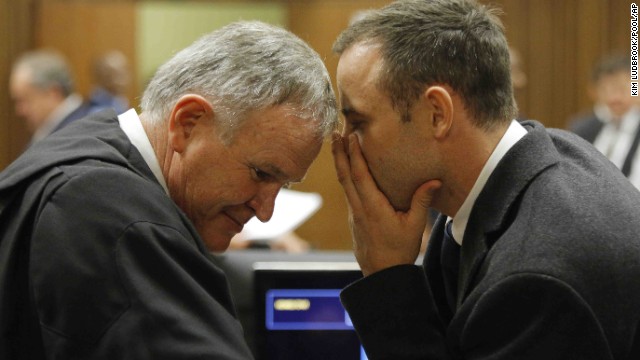 Pistorius talks with Roux inside the court on March 4.
Pistorius talks with Roux inside the court on March 4. 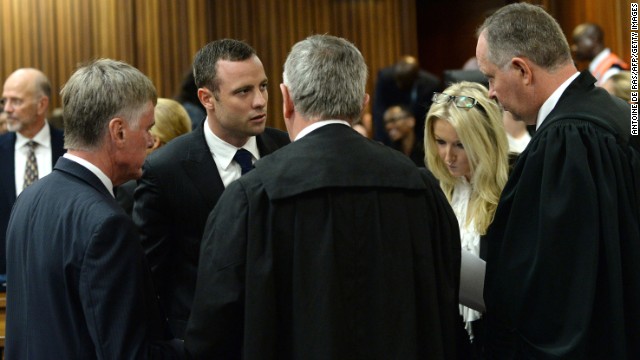 Pistorius speaks with his legal representatives on March 4.
Pistorius speaks with his legal representatives on March 4. 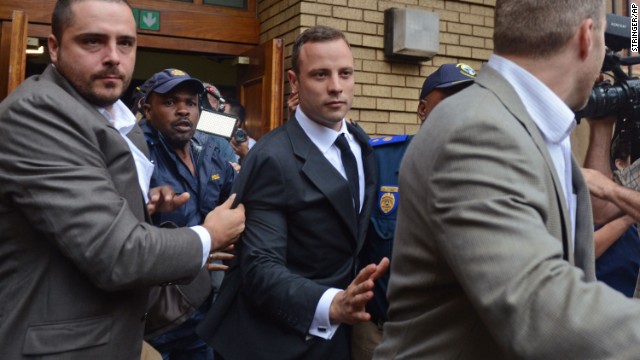 Pistorius is escorted out of the court Monday, March 3, after the first day of his murder trial.
Pistorius is escorted out of the court Monday, March 3, after the first day of his murder trial.  People try to get a glimpse of Pistorius as he leaves the court building on March 3.
People try to get a glimpse of Pistorius as he leaves the court building on March 3. 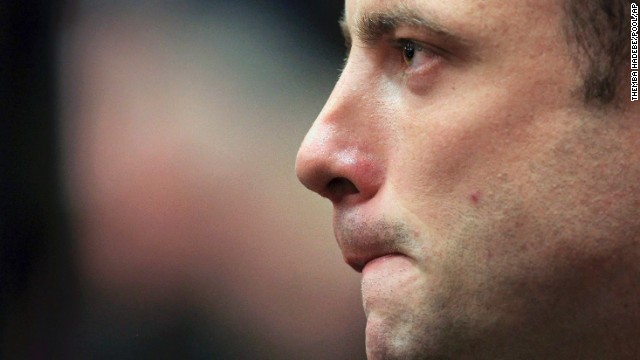 Pistorius is seen shortly after arriving for his trial on March 3.
Pistorius is seen shortly after arriving for his trial on March 3. 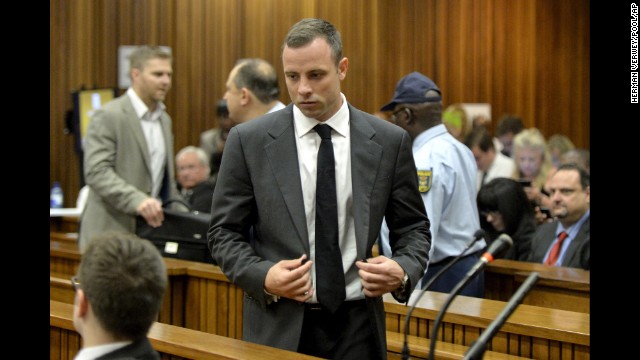 Pistorius walks into the courtroom on March 3.
Pistorius walks into the courtroom on March 3. 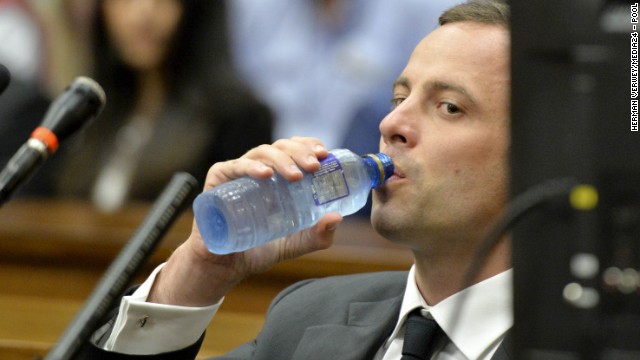 Pistorius takes a drink of water March 3 during his trial.
Pistorius takes a drink of water March 3 during his trial. 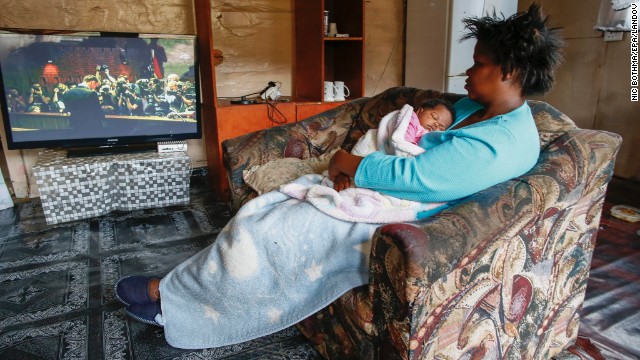 The case has captivated South Africa. Here, Lauren Wentzel watches the proceedings from her home outside Cape Town on March 3.
The case has captivated South Africa. Here, Lauren Wentzel watches the proceedings from her home outside Cape Town on March 3.  June Steenkamp arrives at the court building for the start of the trial.
June Steenkamp arrives at the court building for the start of the trial. 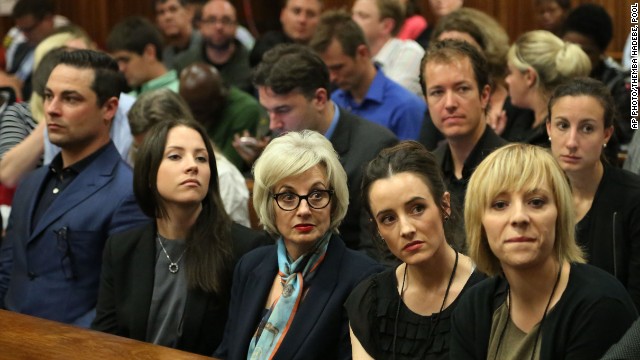 Pistorius' relatives wait inside the courtroom on March 3.
Pistorius' relatives wait inside the courtroom on March 3. 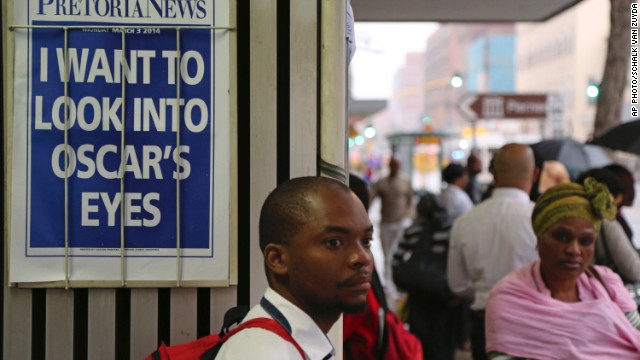 People at the court building wait for Pistorius' arrival on March 3.
People at the court building wait for Pistorius' arrival on March 3. 





































No comments:
Post a Comment